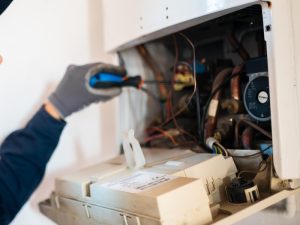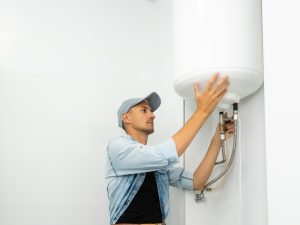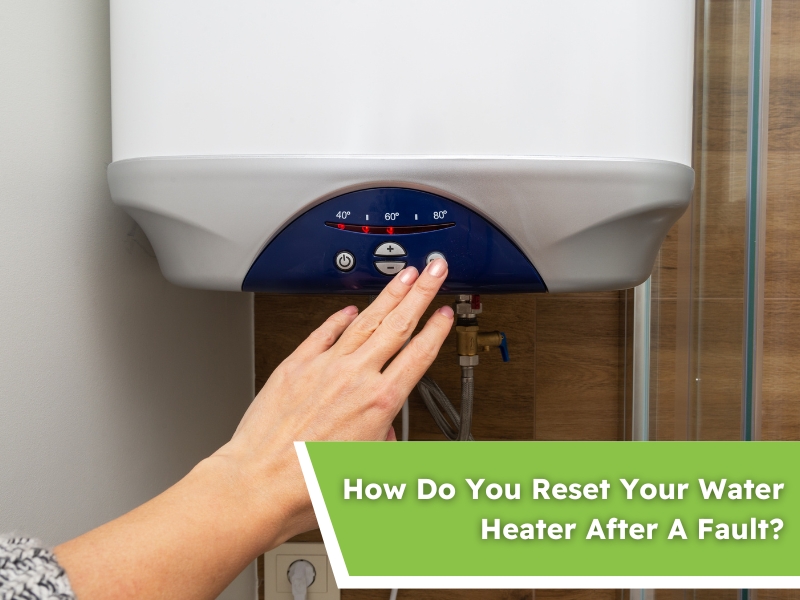Experiencing a sudden lack of hot water can be frustrating. Often, this issue arises from a tripped reset button on your water heater. Understanding how to safely reset your water heater and knowing when to seek professional help can save you time and discomfort.
Why does your water heater need a reset?
Water heaters are equipped with safety features to prevent overheating and potential hazards. One such feature is the reset button, also known as the high-limit safety thermostat switch. Several factors can cause this button to trip:
- Overheating: If the water temperature exceeds safe levels, the reset button will trip to prevent scalding and damage.
- Faulty thermostat: A malfunctioning thermostat may fail to regulate the water temperature, leading to overheating.Loose wiring: Electrical connections can become loose over time, causing irregularities that trip the reset button.
- Defective heating element: A short heating element can continuously heat the water, causing the system to overheat.
Identifying the root cause is essential to ensure your water heater’s safe and efficient operation.
Where can you find the reset button on your water heater?
Locating the reset button is straightforward:
- Turn Off the power: Before inspecting, switch off the circuit breaker dedicated to your water heater to ensure safety.
- Access the panel: The reset button is typically situated behind a metal panel on the side of the water heater.
- Remove insulation: Upon removing the panel, you might find insulation covering the thermostat and reset button. Carefully pull back the insulation.
- Identify the button: Look for a red button near the thermostat; this is the reset button.
Always ensure the power is off before accessing internal components to prevent electrical hazards.
What steps should you follow to reset your water heater safely?
Resetting your water heater involves a few careful steps:
- Turn off the power: Ensure the circuit breaker connected to the water heater is switched off.
- Access the reset button: Remove the metal panel and insulation to expose the reset button.
- Press the reset button: Firmly press the red reset button until you hear a click, indicating it has been reset.
- Reassemble the components: Replace the insulation and secure the metal panel back in place.
- Restore power: Turn the circuit breaker back on.
- Wait and test: Allow the water heater about 30 minutes to heat the water, then check for hot water at a tap.
Troubleshooting hot water system problems early can help you identify potential issues before they cause major disruptions, saving both time and money in the long run. If the water heater continues to malfunction, further inspection may be necessary.
What if your water heater fails to restart?
If resetting doesn’t restore hot water, consider the following:
- Check the circuit breaker: Ensure it hasn’t tripped again. If it has, there might be an electrical issue.
- Inspect for loose wiring: Loose or damaged wires can prevent the water heater from operating.
- Evaluate the thermostat and heating elements: Faulty components can hinder performance.

In such cases, it’s advisable to consult a professional plumber to diagnose and address the problem safely. Seeking professional hot water system repair services can help diagnose and fix the issue efficiently, ensuring a reliable hot water supply in your home.
How can you prevent future issues with your hot water system?
Regular maintenance can enhance the longevity and efficiency of your water heater:
- Annual inspections: Schedule yearly check-ups to identify and rectify potential issues early.
- Flush the tank: Sediment buildup can affect performance; draining the tank annually helps maintain efficiency.
- Test the pressure relief valve: Ensure it’s functioning correctly to prevent pressure-related problems.
- Inspect anode rod: To avoid tank corrosion, check and replace the anode rod as needed.
Maintaining your water heater regularly is essential for improving water heater energy efficiency, helping reduce energy consumption and lower your utility bills over time.
When should you call a professional for water heater repairs?
While minor issues can be addressed independently, certain situations warrant professional intervention:
- Persistent tripping of the reset button: Continuous tripping indicates underlying problems that need expert attention.
- Unusual noises: It sounds like popping or banging, which may suggest sediment buildup or other issues.
- Water discolouration or odour: Rusty or foul-smelling water can indicate internal corrosion or bacterial growth.
- Leaks: Any signs of water leakage require immediate professional assessment.

Addressing these issues promptly with the help of a qualified plumber ensures safety and prevents further damage.
Expert hot water system repairs by Eco Plumbers 24/7
At Eco Plumbers 24/7, we take pride in delivering reliable and eco-friendly hot water system repairs across Sydney. Whether you’re dealing with a faulty thermostat, a tripped reset button, or a complete system failure, our experienced team is here to help.
Customers trust us for our prompt response, professional workmanship, and fair pricing. One recent client shared their satisfaction with the service, highlighting the professionalism, efficiency, and reasonable cost. They were pleased with the quality of work and highly recommended our services for plumbing needs.
If your water heater isn’t working as it should, schedule a service with Eco Plumbers 24/7. We offer emergency plumbing services and sustainable solutions to ensure your home or business has a reliable hot water supply.
Frequently Asked Questions
- How long does it take for a water heater to heat up after resetting?
Typically, the water takes about 30 minutes to an hour to reach the set temperature after a reset.
- Is it safe to reset my water heater myself?
Yes, but always ensure the power is off before attempting a reset to avoid electrical hazards.
- Can a faulty thermostat cause my water heater to stop working?
Yes, a faulty thermostat can prevent the heating element from turning on, resulting in no hot water. It may also cause the system to overheat, triggering the reset button.
- How often should I service my water heater?
It’s recommended to have your water heater inspected annually to ensure optimal performance and prevent potential issues.
- Why does my water heater keep shutting off unexpectedly?
If the reset button on your water heater trips repeatedly, it often signals an underlying problem. This could include a malfunctioning thermostat, a broken heating element, or electrical issues. In these cases, it’s advisable to consult a qualified plumber for a comprehensive evaluation.
- Is it safe to reset my water heater multiple times?
No, resetting your water heater multiple times without identifying the cause can lead to further damage or safety hazards. If your unit continues to shut off, seek professional assistance.
- Should I turn off my water heater if I go on holiday?
Yes, turning off your water heater while away for an extended period can help reduce energy consumption and prevent potential issues. For gas heaters, turn the thermostat to “pilot” mode, and for electric heaters, switch off the power at the circuit breaker.

